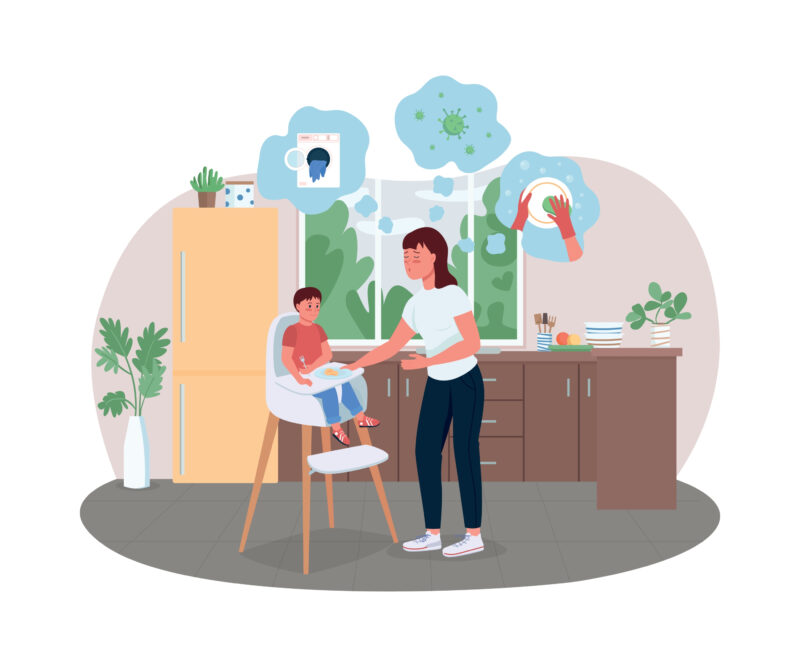The pandemic and the lifestyle changes it required affected all of us in one way or another. Still, for those caregivers of older loved ones, the shifts in your lives were among the most dramatic – and the most traumatic – of any group of people. What may have been a part-time situation that allowed for in-home care or time at adult daycare centers suddenly became a 24/7 job with little to no respite available, causing increased caregiver stress.
This pandemic phenomenon among caregivers has increased the incidence of PTSD – post-traumatic stress disorder – among caregivers, specifically something known as PCSD, or post caregiver stress disorder. Caregiving is a highly demanding and emotionally draining, usually unpaid, job, and whether you’ve witnessed the sudden onset of an illness or a gradual decline in someone you care about, the trauma of watching a loved one deteriorate while you care for them causes tremendous stress.
Why caregivers are so stressed out
According to a study by Pew Research, there were 40.4 million unpaid caregivers of adults ages 65 and older in the United States in 2015. Of those, 22% were caring for two people. Also, 61% of family caregivers worked at a job earning money during their caregiving experience in a survey done in 2019. As a result, a lot of caregivers are overworked and exhausted.
Caregiving is a job without much downtime. If you’re the primary caregiver for an older adult, you’re constantly on call and doing many different tasks to keep your loved one healthy and safe. If you also have a job or children and other family members to care for, your time is stretched extremely thin—but that’s not the most challenging part. For most caregivers, the hardest part is the emotional toll of caregiving. Unfortunately, caregiver stress has not been a priority in the mental health community.
“There remains very little research or attention on PTSD among caregivers,” says Ranak Trivedi, MD, an assistant professor of psychiatry and behavioral sciences at Stanford University, told Next Avenue. “As clinical psychologists, we are also recognizing that chronic stress that is unrelenting – such as through caregiving – can lead to PTSD.”

What can caregivers do to relieve their stress?
At the top of the list of things you should do to relieve stress is take care of your health. Eat right, exercise when you can, and get enough rest. Fitting these things into your life may sometimes be easier said than done, but try to carve out little pockets of time during your day to get in a 10-minute walk around the block or a 20-minute nap to boost your energy and give yourself a break from the hard work you’re doing.
Other ways to relieve stress include:
- Tackle small tasks that have a start and finish, like laundry or cooking a simple meal.
- Have an ongoing creative project like knitting, paint-by-numbers, journaling or organizing family photos. If you can do it with your loved one, even better.
- Watch a funny movie or TV show. A good laugh is priceless for making stress disappear.
- Adopt a housebroken older dog or cat for unconditional love.
- Learn to meditate and do it each morning.

Find ways to get help when you need it
Caregiving should not be a one-person job. If you’re the primary caregiver for a loved one, make sure you have people or resources to go to when you need support, and don’t hesitate to ask for help. Your mental and physical health is as vital to your loved one’s well-being as theirs is.
Sources for support are:
- Family members: Schedule available family members to take over for you a few hours a week.
- Friends: Go out with friends for a fun evening a few times a month.
- Respite care: Plan a weekend away and take your older adult to a respite care center for a few nights. They’ll be fine!
- In-home care: If it’s within your means, hire someone to come in a few days or hours a week to help. Don’t feel guilty or uncomfortable about giving someone else the responsibility. It would be best if you had a break.
- Adult daycare: Take your loved one to an adult daycare center for social interaction and activities.
Don’t dismiss feelings of depression, anxiety or hopelessness
It may not be unusual for caregivers to feel depressed, anxious or hopeless, but that doesn’t mean it needs to be an ongoing problem. Support groups for caregivers are available, including the Family Caregiver Alliance, which offers online support groups, and the Well Spouse Association that focuses on supporting caregiving spouses.
If you cannot get past your unhappy or anxious feelings, see your doctor about available treatments, including therapy and medication.
Caregiving is a heroic act, and caregivers should be treated like heroes. If you’re struggling, you’re not alone, so use the resources and connections you have to find help or seek new ones.

